50 CAUSES OF DISTRACTED DRIVING: THINGS YOU MAY OR MAY NOT REALIZE ARE DISTRACTING YOU ON THE ROAD
According to the National Safety Council, distracted driving causes about 3,000 deaths a year in the United States. Distractions range from radios and GPS navigators to pets and other passengers. Understanding potential distractions helps you anticipate and avoid them, thereby lowering the risk of an accident. The remainder of this page explores the wide range of possible distractions that can ultimately lead to serious injuries and fatalities.
TECHNOLOGY AND DRIVING
Newer vehicles are loaded up with all sorts of gizmos and gadgets, many of which are distracting for drivers when they take their minds and eyes off the road. While driving, limit your technology use to what’s necessary.
TEXTING
Texting takes your mind and your hands away from the wheel. Every state (except Montana) prohibits texting while driving to decrease the number of distracted driving accidents.
USING THE PHONE
Talking on the phone, even hands-free, takes your attention away from driving. If you believe taking a call is necessary, pull over into a safe area to make or receive the call.
BROWSING SOCIAL MEDIA APPS
Browsing social media costs precious seconds you could otherwise use to avoid hitting another vehicle or a pedestrian. It can wait until you’re safely parked.
SEARCHING THROUGH A PLAYLIST OR CHOOSING THE RIGHT SONG
Set your music before you drive. Searching for a specific song or playlist takes your mind off safe driving.
SETTING OR CHANGING A DIRECTION WITH GPS
Set up your GPS before starting your trip. Pull over if you forgot to do so or need to change directions. If you drive a lot, consider using a GPS that can take verbal commands.
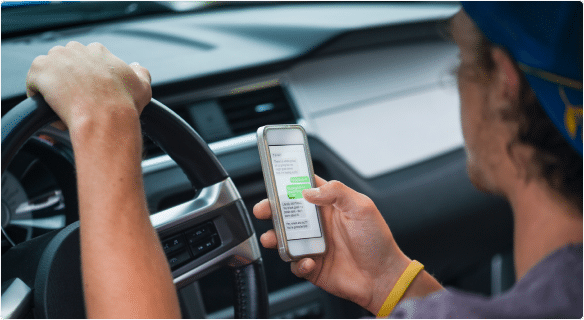
DOING WORK OR RESPONDING TO EMAILS
It’s better to be late to work or respond later than risk a distracted driving accident. If it’s something you must address immediately, pull over.
FOLLOWING GPS INSTRUCTIONS TOO CLOSELY
Pay attention to your surroundings rather than simply obey everything your GPS suggests. Trust your senses and intuition to tell you when it’s safe to follow instructions.
WATCHING A TV SHOW OR SPORTS GAME
Checking the score or keeping up with a scene can eat up the seconds you might use to avoid hitting a pedestrian or road hazard. If you are very invested, pull over to check in or wait until you are home.
USING HEADPHONES
Checking the score or keeping up with a scene can eat up the seconds you might use to avoid hitting a pedestrian or road hazard. If you are very invested, pull over to check in or wait until you are home.
BEING ENGROSSED IN A PODCAST OR AUDIOBOOK
Again, you aren’t focused on driving when you become too involved in what you’re listening to. Save content you’re interested in for a moment when you are not behind the wheel.
RUBBERNECKING
Rubbernecking happens when drivers focus on surrounding distractions as they pass by, such as a vehicle crash, emergency response, or arrest. It can take your eyes off the road for long periods and lead to your own accident.
ADMIRING SCENERY
Though perhaps welcome, beautiful scenery is still a distraction. If you want to admire your surroundings, consider pulling over into a safe spot, such as a park or recreation area.
DAYDREAMING
It is natural for the mind to wander, especially after driving for long periods or when there is a lot going on in your life. If you cannot focus, pull over to think things through.
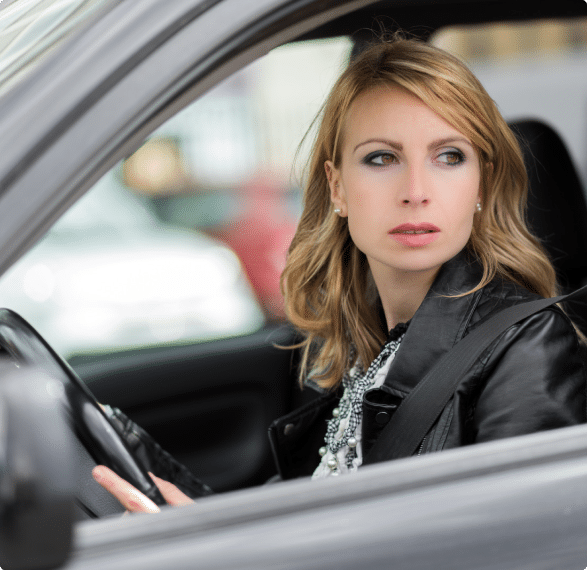
LOSING FOCUS AT THE WHEEL
Safe driving requires focusing on all your senses. Always pay attention to the road and avoid these common ways drivers lose their focus.
LOOKING AT BILLBOARDS
Some cities are filled with billboards. Limit the amount of time you spend gazing at them as they pass by. If one catches your eye, you can double back or search online once safely parked.
HAVING TO GO TO THE BATHROOM
Use the bathroom before trips or pull over to find a restroom if you really need to go. An extreme urge to use the bathroom can affect your attention span.
HYPNOSIS
Zoning out while driving is sometimes known as “highway hypnosis,” which can cause you to forget entire stretches of your trip. This is common on long drives. Get enough rest before embarking, take breaks, and turn off cruise control to increase focus.
BEING DROWSY OR TIRED
When you’re tired, chances are you will also be less focused on the road. According to the CDC, drowsy driving causes over 6,000 deaths per year. So, make sure you are well-rested when you get behind the wheel, and make sure you take breaks when embarking on a long drive.
HANDLING YOUR VEHICLE
Make all necessary adjustments to your vehicle before your trip to avoid dangerous distractions.
ADJUSTING VEHICLE CONTROLS
Make all vehicle control adjustments (e.g., check the temperature, set your GPS, and clean your windshields) before you take off.
ADJUSTING MIRRORS
Though perhaps welcome, beautiful scenery is still a distraction. If you want to admire your surroundings, consider pulling over into a safe spot, such as a park or recreation area.
ADJUSTING SEAT BELTS
Be sure your seatbelt is properly fitted before you begin driving. Adjusting the belt can take your mind, eyes, and hands off the road.
LEARNING VEHICLE CONTROLS
When using someone else’s car or a rental, explore the critical controls, such as windshield wipers and high beams, before driving. If necessary, pull over rather than try to figure things out while driving.
INTERACTIVE CONSOLES
Interactive consoles increase the time with your eyes and mind off the road. It takes drivers an average of 40 seconds to enter navigation information, enough time at 25 miles per hour to travel 400 yards.
DASHBOARD INDICATORS
Even a good driver can be distracted by dashboard lights, especially if they emit a warning signal. Stay focused on driving until you can pull over safely.
PROGRAMMING OR ADJUSTING RADIO STATION
Leave your radio alone until you’re at a stop light or the traffic isn’t moving. Boring music is preferable to an accident caused by adjusting your playlist.
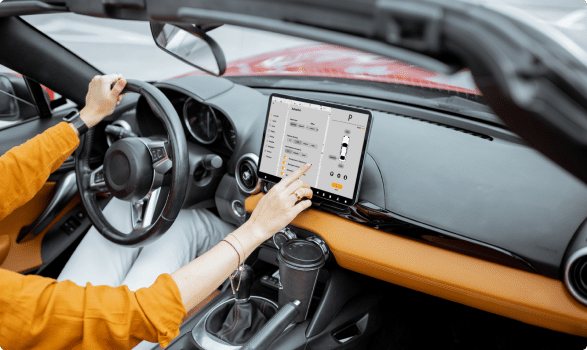
MULTITASKING WHILE DRIVING
When you’re driving, your vehicle and the road in front of you should be your primary focus, if not your sole focus. Multitasking takes your eyes off the road and distracts you from hazards around you.
EATING OR DRINKING
Drink your coffee and eat your breakfast sandwich before you start driving. If you choose to eat food or drink a beverage while driving, be sure it’s ready and easy to reach before taking off.
DOING MAKEUP
Applying makeup while driving takes your eyes off the road and your focus off your surroundings. Apply makeup before your trip or once you arrive.
BRUSHING HAIR
If you need to do your hair, tend to it before or after you arrive at your destination.
REACHING FOR A WALLET
There’s nothing in your wallet that you need while driving. Wait until you’re safely parked to reach into your purse or pocket.
HANDLING FOOD
Opening food packaging and eating take your focus away from safety. Eat before or after trips, or at least have food ready before you leave.
READING MAPS
Analyzing maps distracts your eyes from the road and your mind from processing potential hazards. If you’re lost, pull over to look at a map or enter new data in your GPS.
RETRIEVING FALLEN ITEMS
If you drop something, leave it until you can safely pull over or reach your destination. Whatever falls will be there when you arrive.
LOOKING IN THE GLOVE COMPARTMENT
There’s nothing in your glove compartment that you absolutely must retrieve while driving. Take out anything you need before your trip or pull over to retrieve items.
CHANGING CLOTHES
Never try to change clothes while driving, no matter how big a rush you’re in. It can wait.
SMOKING
Finding, lighting, and putting out cigarettes can distract you from driving. Pull over for a smoke break.
REMOVING OUTERWEAR
If you are uncomfortable due to too many or too few layers, pull over to adjust.
TRYING TO SWAT AN INSECT
Don’t distract yourself with insects while driving. Try opening the windows or pulling over if a buzzing insect is stopping you from concentrating on driving.
REACHING FOR ITEMS IN THE BACKSEAT
Reaching into the backseat distracts your vision and makes it more difficult to steer. Check your backseat for items you may need before you leave or pull over to retrieve them.
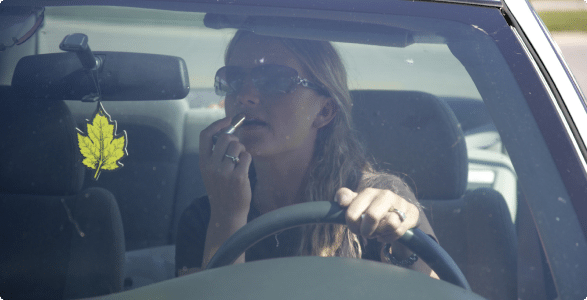
DEALING WITH PASSENGERS
Focus as much as possible on driving, not other people in your vehicle. If passengers in your car are rowdy or otherwise distracting, tell them firmly that you are trying to keep everyone safe.
DEALING WITH PETS
Pull over to deal with non-human passengers. Do not reach back to pet them or give them treats. Keeping your pet in a case or in a pet seat harness is the safest option.
HANDLING CHILDREN
If your child is distracting you from the road, pull over. Reaching back or over to handle children takes your eyes off the road and your hands off the wheel, endangering all of your lives.
HEATED DISCUSSIONS
Arguments while driving heighten your emotions and raise your adrenaline. An altered state of mind can seriously distract you from the road. Ask to table the discussion for later or pull over safely to continue.
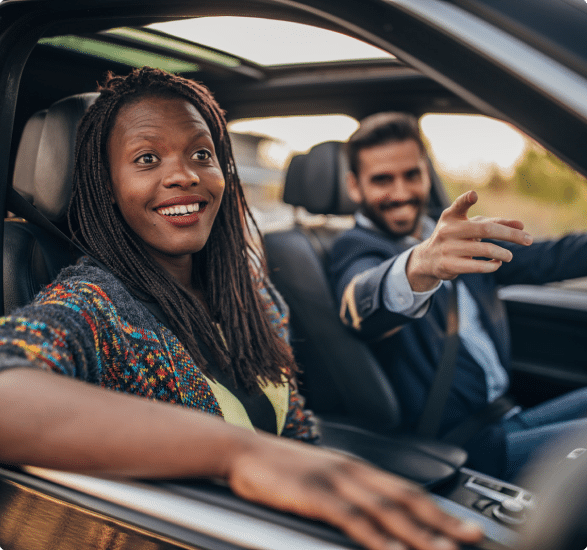
TALKING TO PASSENGERS
Conversations with passengers should be limited to driving conditions if possible. Keep your eyes on the road and limit any lively discussions if they distract you from driving.
SPILLS OR UNEXPECTED MESSES
Even a few seconds of fretting and trying to clean a spill while driving can lead to an accident. Pull over or deal with it when you arrive at your destination.
Other Distractions on the Road
From technology and eating to chatty passengers and rowdy pets, all sorts of things can cause dangerous distractions while driving. Here are a few more things you may or may not have thought about while reading through this page.
LOOKING AT ONESELF IN THE MIRROR
Looking good feels good, and we all check ourselves out from time to time. However, check your appearance once you’re safely pulled over.
SEARCHING FOR PARKING
When you spend too much time gazing around for parking, you don’t have your eyes on the road ahead. Your peripheral vision can help when looking for a parking spot but do not forget to keep your eyes peeled for hazards in front of you.
LOUD MUSIC
Loud music increases driver reaction time to hazards by distracting your hearing and other senses. Music on the road can be relaxing and even improve concentration. However, excessively loud music can insulate you from your surroundings.
BEING STRESSED, ANGRY, OR SAD
Strong emotions affect driving ability. Stress, sadness, and other emotional/psychological unease can lead to unsteady accelerations, hard braking, speeding, and failing to stop at crosswalks. If you do not feel well, avoid driving until you feel calm again.
HIGH BEAMS IN THE EYES
High beams approaching from the front or rear are distracting, and you should avoid looking directly into them or into your mirror. Also, be sure to follow each state’s high beam laws so you yourself don’t distract other drivers.
TAKING PICTURES
Taking “selfies” or pictures of your surroundings requires taking your eyes off the road. It is not worth the risk. Stay focused on driving.
LOOKING FOR AN ADDRESS OR LANDMARK
Sometimes, we drive past our intended destination. As we scour our surroundings looking for an address and landmark, we may cause an accident. Take care.
OTHER DRIVERS
It can be hard to ignore constant honking or tailgating by other drivers. Drive safely, take precautions, and do not let other people’s unsafe or unreasonable behavior sway your good judgment.
CONTACT US TODAY IF YOU WERE INJURED IN A DISTRACTED DRIVING ACCIDENT
Distracted driving causes countless accidents, injuries, and deaths every year throughout the country. Though we cannot name them all, this page just goes to show that there are countless distractions on the road. Whether they are inside or outside your vehicle, do your best to avoid distractions when driving.

